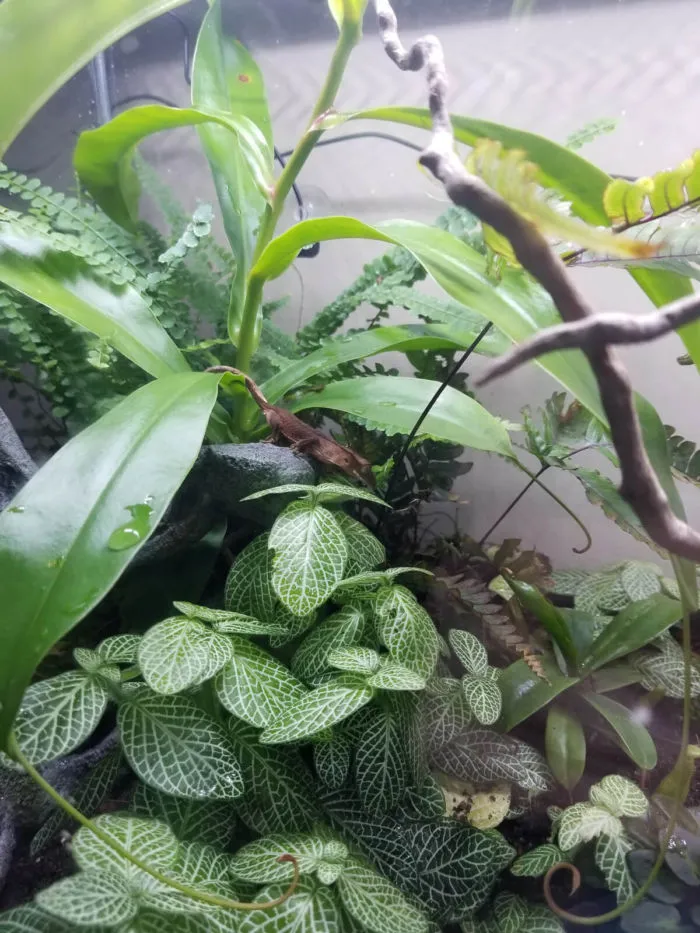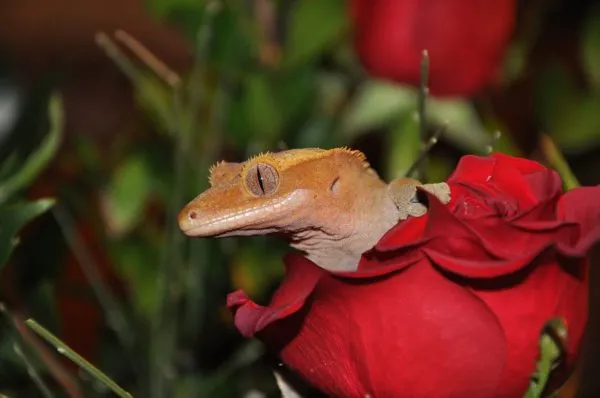 As you work to put together a great crested gecko habitat, you likely think of lots of questions about what you need. One of the most common ones we get is, “Do crested geckos need UVB?”
As you work to put together a great crested gecko habitat, you likely think of lots of questions about what you need. One of the most common ones we get is, “Do crested geckos need UVB?”
Do Crested Geckos Need UVB? The answer is, not really. Some gecko keepers argue that it can make the reptiles more active and that it is closer to nature when you keep them with UVB. It will certainly not hurt your crested gecko. You can save money by not buying one.
Now you know that the UVB bulb is totally optional. To learn more about the purposes of these bulbs, plus make your own decision about having one, keep on reading.
Why Don’t Geckos Need UVB Lighting?
These little guys are nocturnal, and therefore do not require UVB lighting. You might add a low level of UVB lighting because it cannot hurt them and may improve their health. If you do choose to do this, be sure that you monitor the habitat, so it does not get too hot.
You should also make sure that you add in plenty of leaf cover as well as hiding places, so your gecko does not retain eye damage as a result of constant UVB exposure. Crested geckos need only 4-6 hours per day of UVB.
A habitat that is too hot will result in hiding geckos, not to mention discomfort for the reptiles. One amazing thing about crested geckos is that they do well at room temperature.
You actually don’t need to use any special light or heating. However, people that live in cold climates or prefer to have real plants in their enclosure should pay attention to fixtures and lights.
Plus, even if you live in a warm place but can get cold snaps, you might want to have these lights on hand for peace of mind.
It is also not recommended that crested geckos be put near a window where the sun comes pouring in. It can get very hot very fast, and the UVB wavelengths are lost when they pass through the window’s glass.
Reptiles and Lighting: Why It Matters
Every creature big and small needs light and heat. It is important for happiness, well being and growth. Just like a sunny day makes us humans feel happy and warm, and gets us vitamins, your household reptiles need light so they too can feel good.
Some reptiles, like bearded dragons, rely on light to keep their daily routine intact. Heat, as well as light, regulates the circadian rhythm of your reptile. He knows when to sleep, eat and live. He will not be as stressed, and he will enjoy better health.
Thankfully, lighting is not so hard to keep up with when it comes to reptiles. You just need to learn about and understand the different fixtures and lightbulbs, so your crested gecko feels at home 100% of the time.
The Differences of the Lights
Reptiles must at least have UVA light in order to live healthily. Some gecko keepers feel that UVB light is also necessary, although we will discuss why this is isn’t needed.
The UV spectrum is comprised of three different segments: UVA, UVB, UVC. They are natural and can be found in regular sunlight.
UVA lights are used for behavior regulation: When to feed, diurnal activity, mating, and other daily actions.
UVB lights aid in the production of Vitamin D3. This helps the reptile absorb calcium.
UVC light is not required for your crested gecko. However, it may aid in the killing of bacteria. Please note that high exposure levels are harmful to animals.
You will always want to make sure that the bulbs are directly exposed to the habitat. Plastic, as well as glass, act as filters for the UV wavelengths.
The UV output gets poor over time, and so it is critical to replace your bulbs every 12 months. Mark it on a calendar or set a reminder on your phone so your gecko is always with adequate lighting.
We also recommend reading our article below:
Do Crested geckos need a heat lamp?
How To Acclimate New Crested Geckos?
Lighting plays a huge factor in acclimating your new gecko to his home. It all starts the moment your little fellow is packaged into his shipping container and sent to the store.
Geckos get stressed from the act of being shipped. Combine this with being brought into a strange new environment, and you have one very uncomfortable gecko.
This is where you come in. By setting up the habitat in the best way possible, you can calm that little creature down in a short period of time- a few days at most.
Most breeders actually keep crested geckos in boxes made of plastic on a rack. These geckos do not get any overhead light except for whatever light is being used to light up the room. Heat tape placed under the box keeps them warm.
Although it may sound cruel, geckos raised like this actually do great! And most gecko keepers prefer the glass
However, geckos simply aren’t fans of change. You might find that your gecko is stressed out by his glass home. And if you use a bright daytime light bulb, that stress could amplify.
The point we are driving home is that geckos don’t care much for bright light. Whenever the light is too bright, they will hide. So, we will now show you how to use a light to make your crested gecko feel right at home.
Lighting Steps for Crested Gecko
- Make sure you use a blue nocturnal bulb that gives off low light.
- You might even introduce a heat pad, so they stay warm. (We explain why heat mats are important here!)
- Give your gecko a dark and warm hiding place-they can feel secure this way. (Don’t worry if your Crested gecko hides all the time. Here are 3 reasons for that!)
- For your first two weeks together, handle them only occasionally. (Read our Crestie Bonding Guide for more info!)
- Put up black paper or cardboard on the outside of your
tank . As the weeks go on, take off one side at a time.
As you can see, the lighting geckos prefer and need goes beyond UVA, UVB and UVC. Be sure you follow these steps, so your gecko feels happy and comfortable.
Parameters for the Heating and Lighting Fixtures
Crested geckos do best at 60 to 80 degrees F. Anything below or above these ranges is not safe for a crested gecko. They will be fine at lower temps for short periods of time.
Keeping your gecko warm is important because it is how he will grow. The
You can keep them warm during these times by providing a heat lamp or other mechanism to keep them comfortable. However, if the room in which they live is warm year-round, it is not needed.
What makes a good light? Avoid incandescent bulbs. They can be too hot for a smaller sized
Zoo Med makes great lights. For crested geckos, the infrared bulbs for night viewing are good. Another strong choice is the moonlight or blue spectrum bulbs that you can keep on all night.
If you do keep these lights on, observe your geckos closely. It could serve as an interruption to their usual nighttime habits. They may be able to see the waves from these lights, although at this time this is not known.
One thing to know is that you should NEVER use blacklights as they emit UVAs. UVAs could result in health issues for your gecko if exposed for long periods of time, such as damage to the skin, eyes and immune system.
Heat Gradients
If possible, you should also provide a “heat gradient” for your gecko. This lets your gecko go where it’s comfortable at any given moment.
One side of the cage will be cool, approximately 65 degrees F, while the other side will have a basking spot with and 80-degree temps.
In the middle of the enclosure is where your gecko can hang out if he just needs a medium place to hang out.
This is great for people who have experience with reptiles, and a larger
Conclusion
In sum, it is a good idea to carefully plan where you want to put your crested gecko habitat. Make sure you buy a bulb that is appropriate and makes your gecko feel great.
Monitor your crested gecko to see how he fares with the light. And most importantly, make sure to keep a close eye on the
- Enchi Ball Python: A Unique and Stunning Morph of Python regius - March 27, 2025
- Emerald Tree Monitor: The Enigmatic Green Guardian of the Rainforest - March 26, 2025
- The Egyptian Cobra (Naja haje): A Fascinating Serpent - March 25, 2025
